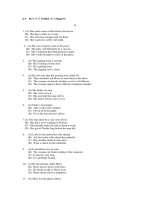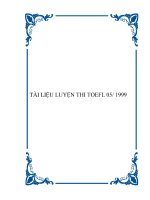Tài liệu Đọc hiểu -TOEFL- Bài 33 pdf
Bạn đang xem bản rút gọn của tài liệu. Xem và tải ngay bản đầy đủ của tài liệu tại đây (70.18 KB, 4 trang )
Reading comprehension -TOEFL- Lesson 33 (Đọc hiểu -TOEFL- Bài 33)
Đọc đoạn văn sau và trả lời các câu hỏi:
Scientists believe they now have scientific evidence to prove that ecosystems work
better when there is a greater variety of species within them. This bio-diversity is
being lost destroying natural mechanisms that could repair the damage caused by
man.
5 Findings show that losing plants and animals is not only reducing our quality of
life but actually endangering our very existence. We cut down rich rain-forests and
replace them with one species plantations, such as pine and eucalyptus. We plough
up meadows rich in different 10 grasses and herbs and replace them with one grass,
for instance rye or wheat.
When a natural ecosystem is simplified the basic processes in the ecosystem are
altered and even damaged. Without their bio-diversity 15 they are not able to serve
as the natural cleaners of our planet. No longer are they able to absorb the carbon
dioxide that is being produced in excess. The result is global warming, caused by
the increase in the "greenhouse effect", and ultimately, or even sooner, there will be
a change in the world's climate.
1. Which of the following is the best title for the passage?
(A) How Ecosystems Work Better
C
(B) The Variety of Species
(C) The Loss of Biodiversity
(D) Natural Mechanisms
2. Which of the following is NOT a species used to replace a rich ecosystem?
(A) Pine
(B) Herbs
(C) Eucalyptus
(D) Rye
3. What is the purpose of paragraph 2?
(A) To give examples of the loss of biodiversity.
B
A
(B) To show natural mechanisms at work.
(C) To give examples of varieties of species.
(D) To show how ecosystems can work better.
4. What according to the passage might be the final result of the simplification
of natural ecosystems?
(A) The basic processes are altered.
(B) There is loss of biodiversity.
(C) There is global warming.
(D) There is a change in the climate.
5. What is the author's attitude to the loss of biodiversity?
(A) Indifferent.
D
D
(B) Negative
(C) Neutral
(D) Positive









